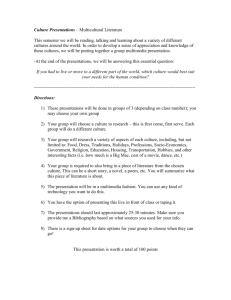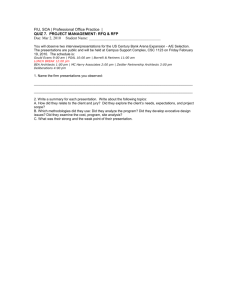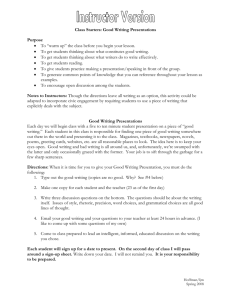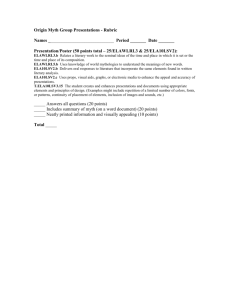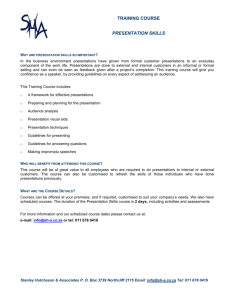BA 324 - Business Communication - Barrett - 01945
advertisement
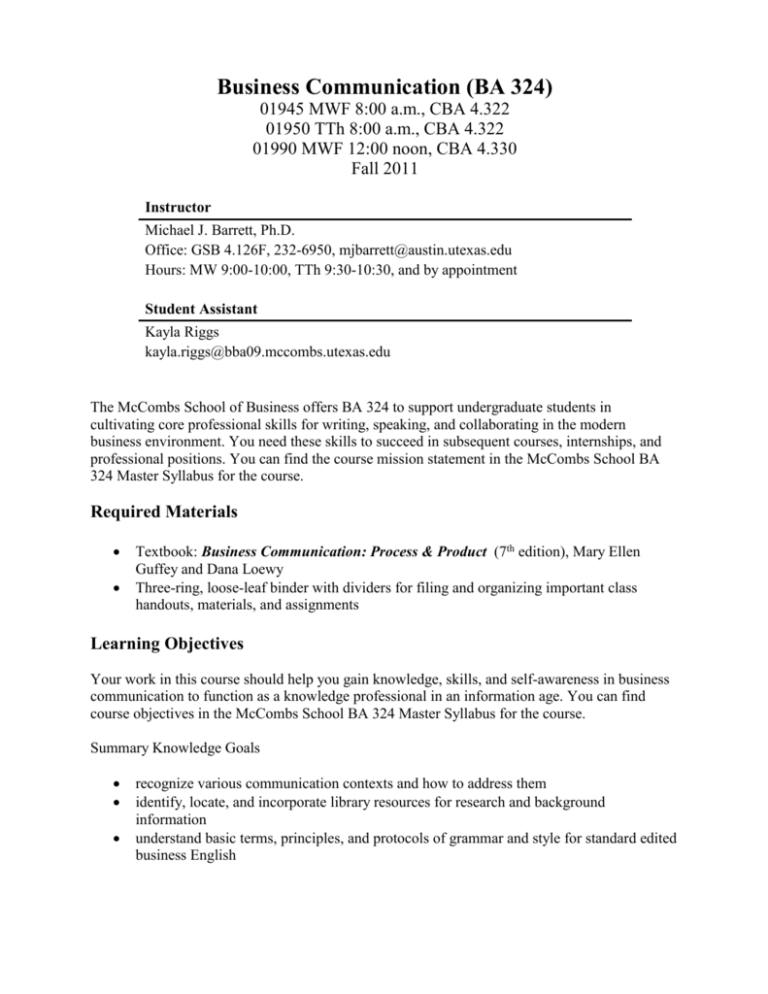
Business Communication (BA 324) 01945 MWF 8:00 a.m., CBA 4.322 01950 TTh 8:00 a.m., CBA 4.322 01990 MWF 12:00 noon, CBA 4.330 Fall 2011 Instructor Michael J. Barrett, Ph.D. Office: GSB 4.126F, 232-6950, mjbarrett@austin.utexas.edu Hours: MW 9:00-10:00, TTh 9:30-10:30, and by appointment Student Assistant Kayla Riggs kayla.riggs@bba09.mccombs.utexas.edu The McCombs School of Business offers BA 324 to support undergraduate students in cultivating core professional skills for writing, speaking, and collaborating in the modern business environment. You need these skills to succeed in subsequent courses, internships, and professional positions. You can find the course mission statement in the McCombs School BA 324 Master Syllabus for the course. Required Materials Textbook: Business Communication: Process & Product (7th edition), Mary Ellen Guffey and Dana Loewy Three-ring, loose-leaf binder with dividers for filing and organizing important class handouts, materials, and assignments Learning Objectives Your work in this course should help you gain knowledge, skills, and self-awareness in business communication to function as a knowledge professional in an information age. You can find course objectives in the McCombs School BA 324 Master Syllabus for the course. Summary Knowledge Goals recognize various communication contexts and how to address them identify, locate, and incorporate library resources for research and background information understand basic terms, principles, and protocols of grammar and style for standard edited business English 2 Summary Skill Goals use the 3x3 writing process to plan, organize, and revise business documents that are correct, appropriate, efficient, and effective deliver effective business presentations in formal and informal contexts collaborate as a team member to complete a project practice effective interpersonal skills to support workplace harmony and productivity Summary Self-Awareness Goals achieve confidence in using 21st century communication technology monitor use of language and gestures to support communication cultivate sensitivity to language-rooted features of messages produced and received Class Policies In any business workspace, professionals know to honor policies—sometimes unwritten—that support harmony, creativity, and productivity. So too should we in our workspace in CBA 4.322. In concert with course policies included in the McCombs School BA 324 Master Syllabus, here are class policies for our learning community. Put away the electronic devices, including the notebooks/laptops/netbooks, smart phones, iPods, and the rest. Each class session is a business meeting, making the time inappropriate for surfing, texting, tweeting, or messaging. When you need laptops for team presentations and a few in-class workshops and assignments, I’ll announce the dates. And please silence your devices, including vibration notification, which is hardly silent. Come to class on time and prepared, with reading or homework complete and with the textbook, course materials, loose-leaf binder. Be ready to be a productive member of your project team. And you’ll use these materials for most in-class activity, which may be brief and which may not be made up. Arriving late affects your class participation grade, as well as costing you the opportunity to earn quiz credit and costing you the goodwill of your team members. Respect yourself, your classmates, and me by turning in neat, polished work. Assignments you complete outside of class should be typed, appropriately formatted, and proofed. Don’t let your computer’s spell- and grammar-check functions let you down. Meet deadlines. Turn in a paper copy in class on the scheduled due date (or earlier if you’re not going to be in class that day. Don’t trust your printer, driver, software, or power source: equipment failure doesn’t give you an acceptable excuse for late work. In business, when it positively absolutely has to be there, it positively absolutely has to be there. No different here. Plan ahead. This course challenges you to model professional skills and behaviors, so your grade will be affected by attendance and punctuality. After three (in MWF sections) or two (in TTh sections) unexcused absences, your point total for the final grade will be debited one point for each additional unexcused absence, and six or more unexcused absences can result in a substantial reduction of at least a letter grade for the course. Be a good teammate. Your course grade, no less than your reputation, depends critically on your reliability in fulfilling your team responsibilities. If you fail to participate actively 2 3 or productively in your team, forcing the other team members to do work you should have done or making their work much more difficult or stressful, the result will be a substantial reduction in your final course grade. Be scrupulous about academic integrity by fulfilling all the responsibilities listed in the UT Austin Policies for Academic Integrity. Avoiding plagiarism is a key tenet of academic integrity. Ask soon or forever hold your peace. See me for questions about the accuracy of the grading of an assignment within 5 business days of receiving the grade. After that, a graded assignment is not eligible for review. . Components of Your Final Grade Area Points Writing (55%) Writing Assignments (50 each) Team business plan project formal report: work plan, and agreement Team business plan project formal report: individual component Team business plan project formal report: team component Area Total 350 50 75 75 550 Area Total 20 50 100 130 300 Area Total 30 30 90 150 Grand Total 1000 Speaking (30%) Impromptu presentation Prepared presentation: individual Prepared presentation: 2-3 person work group Team business plan project formal report: team presentation Professional Development (15%) Class participation Daily quiz performance Exams Supplemental Credit Opportunities Grammar and expression resources: Guffey, Blackboard, elsewhere Diagnostic and skill-building resources Show and Tell contributions 30-credit threshold: 10 points added to total After dividing the point grand total by 10, BA 324 instructors report final course grades based on a uniform scale established by the McCombs School: A AB+ above 92.9 90-92.9 87-89.9 B BC+ 83-86.9 80-82.9 77-79.9 C CD+ 73-76.9 70-72.9 67-69.9 D DF 63-66.9 60-62.9 below 60 Supplemental Credit Opportunities You can earn a one-time bonus of 10 points—to be added directly to your grand total—by accumulating at least 30 credits from completing optional activities that enrich your learning and 3 4 the class’ experience. This is an all-or-nothing opportunity: you must earn 30 credits to receive the 10 points, and you can earn no more than 10 points. The credit opportunities are in four areas. Grammar and Expression Resources You’ll find abundant supplementary material in the Guffey text and at the Guffey student site at www.meguffey.com, such as the Grammar and Mechanics Guide in Appendix A. And I’ve referenced many of my favorite writing resources on Blackboard, such as real-life text samples, articles and tips by Richard Nordquist, and regular FAQs from the Chicago Manual of Style online. You may also want to receive assistance at the Undergraduate Writing Center (http://uwc. utexas.edu/) in the Flawn Academic Center on the West Mall. Tutors at UWC provide helpful attention and feedback, but they do not edit papers. And online Web sites can be very helpful, such as the popular OWL site from Purdue University (http://owl.english.purdue.edu/ handouts/print/grammar/). We can discuss a plan for you to get extra practice and advice about grammar and expression while documenting your extra work to earn credits as well. Diagnostic and Skill-Building Resources You’ll have opportunities to take optional diagnostic tests or set up an enrichment regimen for honing your skills. Show and Tell Contributions I have been a writer and editor by trade, so everywhere I go I notice language peccadilloes most people don’t, such as the extraneous apostrophe on a sign touting “Taco’s for Sale” or the mindnumbing habit of many people today to say “each and every” when simply “every” would do. This hypersensitivity is my curse, and I’d be very pleased to share my curse with each and every one of you. I’ll award one credit for every contribution you share of something that the grammar police would find fascinating. Jot it down on the Show and Tell Report Form and give it to me before or after class. Because there is so much material out there, there’s a 10-credit maximum. Share signs of the times: notice when you see a local sign with errors or tortured expression. The sign must be in Travis, Williamson, or Hays counties Share speak queasy quotes by politicians, athletes, celebrities, columnists, contributors, commentators, or academics with errors or tortured expression. Share think before you write text samples in magazines, newspapers, or books—printed or electronic—with errors or tortured expression. Share articles, columns, essays, blogs, or tweets about a language or business communications topic. Share a cartoon that I judge worthy to add to my collection about business communication topics. Share ear-rattling stuff you’ve heard in conversation, in media, in class, in meetings, in everyday social interaction. 4 5 Academic Integrity The UT Honor Code If you haven’t already, take a moment to view the UT Austin Web site for elaboration on the university honor code (http://www.utexas.edu/about-ut/mission-core-purpose-honor-code): The core values of The University of Texas at Austin are learning, discovery, freedom, leadership, individual opportunity, and responsibility. Each member of the university is expected to uphold these values through integrity, honesty, trust, fairness, and respect toward peers and community. I expect every student in this course to abide by the University of Texas Honor Code, which means among other things that any work you submit for academic credit will be your own or your team’s own. I encourage you to study together and to discuss information and concepts covered in readings, lectures, and activities. And while you may consult with students in other sections, such cooperation should never involve one student having possession of a copy of all or part of work done by someone else, in the form of an e-mail, an e-mail attachment file, a diskette, or a hard copy. Should copying occur, both the student who copied work from another student and the student who gave material to be copied will receive a zero for the assignment. And the penalty for violation of the code may also include failure of the course and university disciplinary action. During examinations you take individually, you must do your own work, without talking, comparing papers, copying from others, or collaborating in any way. Such proscribed collaborative behavior during the examinations will result in failure of the exam, and it may lead to failure of the course and university disciplinary action. Important University Notices and Policies Behavior Concerns Advice Line (BCAL) If you are worried about someone who is acting differently, you may use the Behavior Concerns Advice Line to discuss by phone your concerns about another individual’s behavior. This service is provided through a partnership among the Office of the Dean of Students, the Counseling and Mental Health Center (CMHC), the Employee Assistance Program (EAP), and The University of Texas Police Department (UTPD). Call 512-232-5050 or visit http://www.utexas.edu/safety/bcal. Emergency Evacuation Policy Occupants of buildings on the UT Austin campus are required to evacuate and assemble outside when a fire alarm is activated or an announcement is made. Please be aware of policies regarding evacuation: Familiarize yourself with all exit doors of the classroom and the building. Remember that the nearest exit door may not be the one you used when you entered the building. If you require assistance to evacuate, inform me in writing during the first week of class. In the event of an evacuation, follow my instructions or those of class instructors. 5 6 Do not re-enter a building unless you’re given instructions by the Austin Fire Department, the UT Austin Police Department, or the Fire Prevention Services office. Tentative Course Schedule I’m indicating my present plans and objectives in this syllabus, but as we go through the semester, those plans may need to change to maximize learning opportunities for the class and to respond to your feedback. I’ll communicate those changes as early and clearly as I can, so continue to check your e-mail frequently and the course site on Blackboard. And of course, be in class every meeting. It’s not incidental that our three weekly gatherings are referred to as “class meetings.” Guffey and Loewy note that “no meeting should be called unless the topic is important, can’t wait, and requires an exchange of ideas” (p. 49). Given those criteria, our meetings certainly qualify as appropriate, providing occasions for productive work. Guffey also says that “if the flow of information is one way and no immediate feedback will result, then don’t schedule a meeting” (p. 49). So, to ensure our meetings are necessary and meaningful, we’ll follow a typical agenda each day that allows for significant interaction, exchange, and collaboration. Typical Class Meeting Agenda Date Purpose Agenda Old Business :00 Quiz :10 Homework Review :15 Show and Tell Topics New Business :20 Lecture, Discussion, Activity, Test, Diagnostic, Review, Presentation, Demonstration, Speaker Action Items Announcements Assignments for Next Class The course schedule reflects the likely agenda items that will change from day to day: the “new business” portion from approximately 20 minutes after the hour through the end, any action items to note before we conclude, and a look ahead at the assignments due for the next class. 6 7 First Class Day: Wednesday, August 24 or Thursday, August 25 (Week 1) Agenda Communicating Consciously Communicating Professionally For Starters—It’s All about Attitude Topics Text Sample, Editing Exercise Meeting and Greeting New Business Administrative Items: Syllabus, Policies, Schedule, Student Integrity Statement Action Items Assignment for Next Class * Obtain text book * Read Chapter 2 Professionalism: Team, Meeting, Listening, Nonverbal, and Etiquette Skills Week 2 August 29-September 2 Topics/Activities Professionalism: MWF Texas Enterprise Site Texas Enterprise Site Checkpoints Grammar and Mechanics Guide: Appendix A Team-Building and Working Collaboratively Calling and Conducting Productive Meetings TTh Checkpoints Grammar and Mechanics Guide: Appendix A Listening, Nonverbal, Etiquette Skills Read Chapter 11: Report and Research Basics Read Chapter 11: Report and Research Basics Read Chapter 12: Informal Business Reports Week 3 September 5-9 Topics/Activities Reports, Proposals, Plans MWF Read Chapter 12: Informal Business Reports TTh Read Chapter 13: Proposals, Business Plans, and Formal Business Reports Team Formation Presentations Skills Introduction of Business Plan Project Read Chapter 13: Proposals, Business Plans, and Formal Business Reports Impromptu Speeches Impromptu Speeches Read Chapter 4: Planning Business Messages Read Chapter 4: Planning Business Messages Read Chapter 5: Organizing and Writing Business Messages 7 8 Week 4 September 12-16 Topics/Activities MWF Impromptu Speeches TTh Impromptu Speeches Process vs. Product Approach to Writing Process vs. Product Approach to Writing Work Plan Agreement Assignment MOD Lab West: April Kessler from UT Libraries Communication Triangle: The Aims and Modes of Writing The Writing Process 3x3 Guffey Plan Prewriting Writing Revising Work Plan Agreement Assignment Read Chapter 5: Organizing and Writing Business Messages Knowing Your Audience MOD Lab West: April Kessler from UT Libraries Communication Triangle: The Aims and Modes of Writing Read Chapter 6: Revising Business Messages Read Chapter 6: Revising Business Messages Executive Summary Assignment Week 5 September 19-23 Topics/Activities MWF Five Arts of Classical Rhetoric Primer in Standard Edited English Executive Summary Assignment Proofreading vs. Editing: The Good, The Bad, and The Ugly Good Grammar Exercise and Activities Five Grammars TTh Five Arts of Classical Rhetoric Good Grammar Exercise and Activities Minimal Marking, Instructor Review, Peer Review Minimal Marking, Instructor Review, Peer Review Read Chapter 8:Positive Messages 8 9 Week 6 September 26-30 Topics/Activities MWF First Exam TTh First Exam First Exam Read Chapter 8: Positive Messages Workplace Communications E-mail Letter Memo Wiki Blog Phone Etiquette Read Chapter 9: Negative Messages Aim, audience, organization, style Read Chapter 9: Negative Messages Aim, audience, organization, style Aim, audience, organization, style Adjustment Letter Assignment Adjustment Letter Assignment Week 7 October 3-7 Topics/Activities MWF TTh Peer Review Peer Review Expression Cues Expression Cues Principles of Survey Construction Peer Review Expression Cues Survey Assignment Survey Assignment The Secret Life of Pronouns The Secret Life of Pronouns 9 10 Week 8 October 10-14 Topics/Activities MWF Grammar and Expression Principles of Public Speaking Grammar Structure Primer Grammar and Usage Agreement and Parallelism Terminal Free Modifiers Individual Prepared Presentations TTh Grammar and Expression Principles of Public Speaking MOD Lab West Group Work Day MOD Lab East Group Work Day Individual Presentation: Speaker Introduction 2-3 Person Research Presentation Assignment 2-3 Person Research Presentation Assignment Week 9 October 17-21 Topics/Activities Individual Prepared Presentations Second Exam MWF TTh Individual Presentation: Speaker Introduction Individual Presentation: Speaker Introduction Individual Presentation: Speaker Introduction Read Chapter 7: Electronic Messages and Digital Media Read Chapter 7: Electronic Messages and Digital Media Second Exam Second Exam Read Chapter 14: Business Presentations 10 Read Chapter 14: Business Presentations 11 Week 10 October 24-28 Topics/Activities Organizing for Impact Building Audience Rapport Visual Aids Delivery, Body Language Posture Sequencing MWF Team Presentations: Making the Lineup Team Presentations: On and Off Center Stage Team Presentations: Transitions, Openings, Closings, Questions MOD Lab West Group Work Day 2-3 Person Research Presentation TTh MOD Lab East Group Work Day Team Presentations: Making the Lineup Team Presentations: On and Off Center Stage Team Presentations: Transitions, Openings, Closings, Questions Week 11 October 31-November 4 Topics/Activities MWF TTh 2-3 Person Research Presentation 2-3 Person Research Presentation External Communication Letter Blog E-Mail 2-3 Person Research Presentation Read Chapter 3: Intercultural Communication Legal and Ethical Responsibilities Cultural Sensitivities Inclusive Language 11 Read Chapter 3: Intercultural Communication Legal and Ethical Responsibilities Cultural Sensitivities Inclusive Language 12 Week 12 November 7-11 Topics/Activities MWF TTh Guest Speaker Guest Speaker Thank You Note Assignment Guest Speaker Notes Full Team Presentations Full Team Presentations: Business Plan Thank You Note Assignment Full Team Presentations: Business Plan Full Team Presentations: Business Plan Week 13 November 14-18 Topics/Activities MWF Full Team Presentations: Business Plan TTh Full Team Presentations: Business Plan Full Team Presentations Full Team Presentations: Business Plan Full Team Presentations: Business Plan Full Team Presentations: Business Plan 12 13 Week 14 November 21-25 Topics/Activities MWF Full Team Presentations: Business Plan TTh Full Team Presentations: Business Plan Full Team Presentations Conducting Project Post-Mortem Grammar and Usage Windup Group Self Evaluation and Debriefing Group Self Evaluation and Debriefing Post-Mortem Grammar and Usage Windup Post-Mortem Assignment Post-Mortem Grammar and Usage Windup Post-Mortem Assignment Week 15 November 28-December 2 Topics/Activities MWF TTh Grammar and Usage Windup Third Exam Grammar and Usage Third Exam CIS Third Exam CIS and Reflection CIS and Reflection 13


